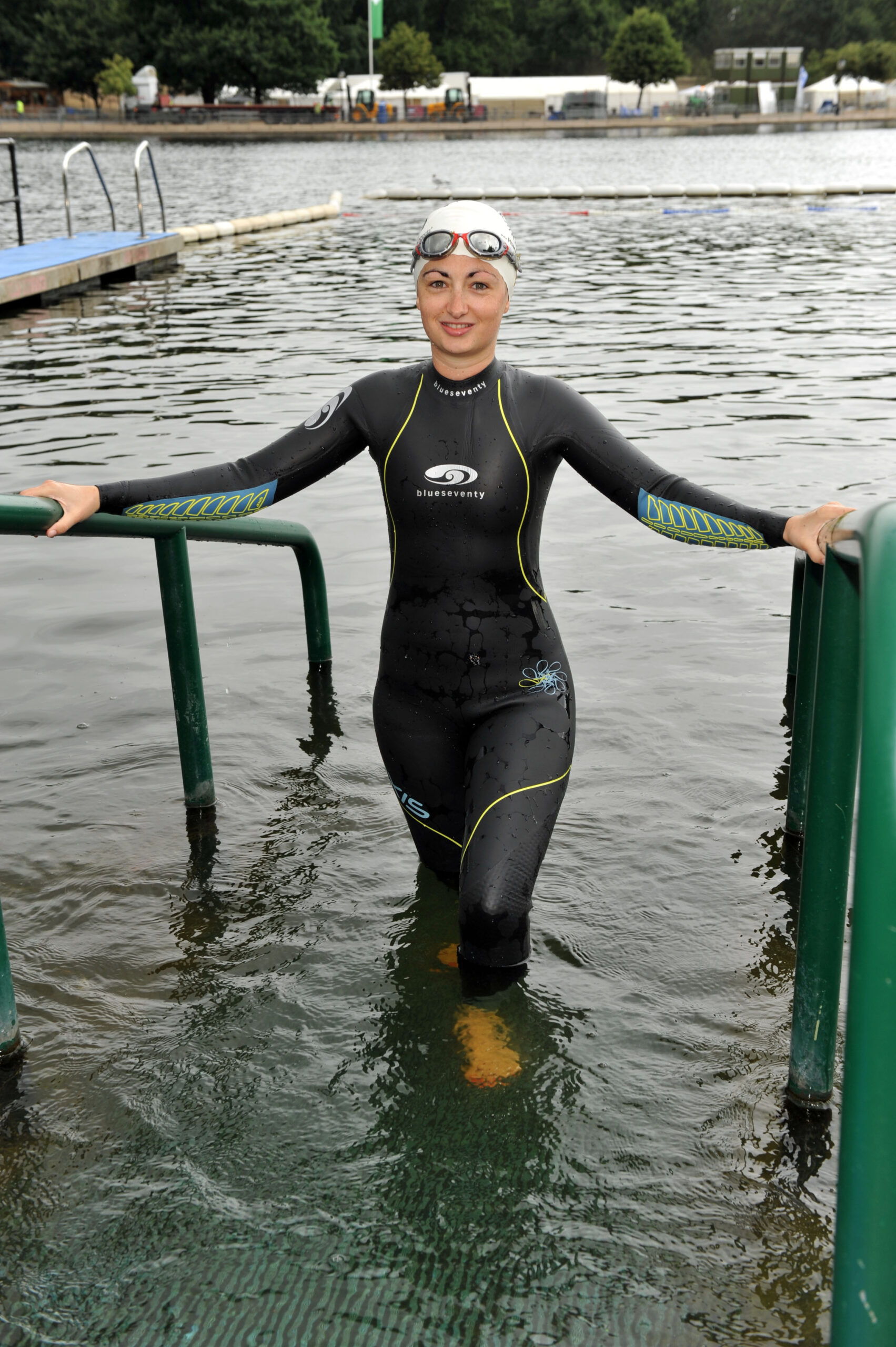Let’s face it, Team GB didn’t need another female short-course superstar. But it was never going to turn away Beth Potter, the swimmer turned Olympian track athlete turned triathlete… who’s also been training with Alistair and Jonny Brownlee since she joined the sport in 2017.
As a former 10,000m specialist, it’s no surprise that Potter’s power comes in the final discipline.
But thanks in no small part to those Yorkshire brothers and their homeland hills, her now well-honed bike skills have helped build a formidable podium-placing package; recently taking back-to-back bronze and silver at the Montreal and Hamburg World Triathlon Championship Series races.
Team GB just got even harder to beat…
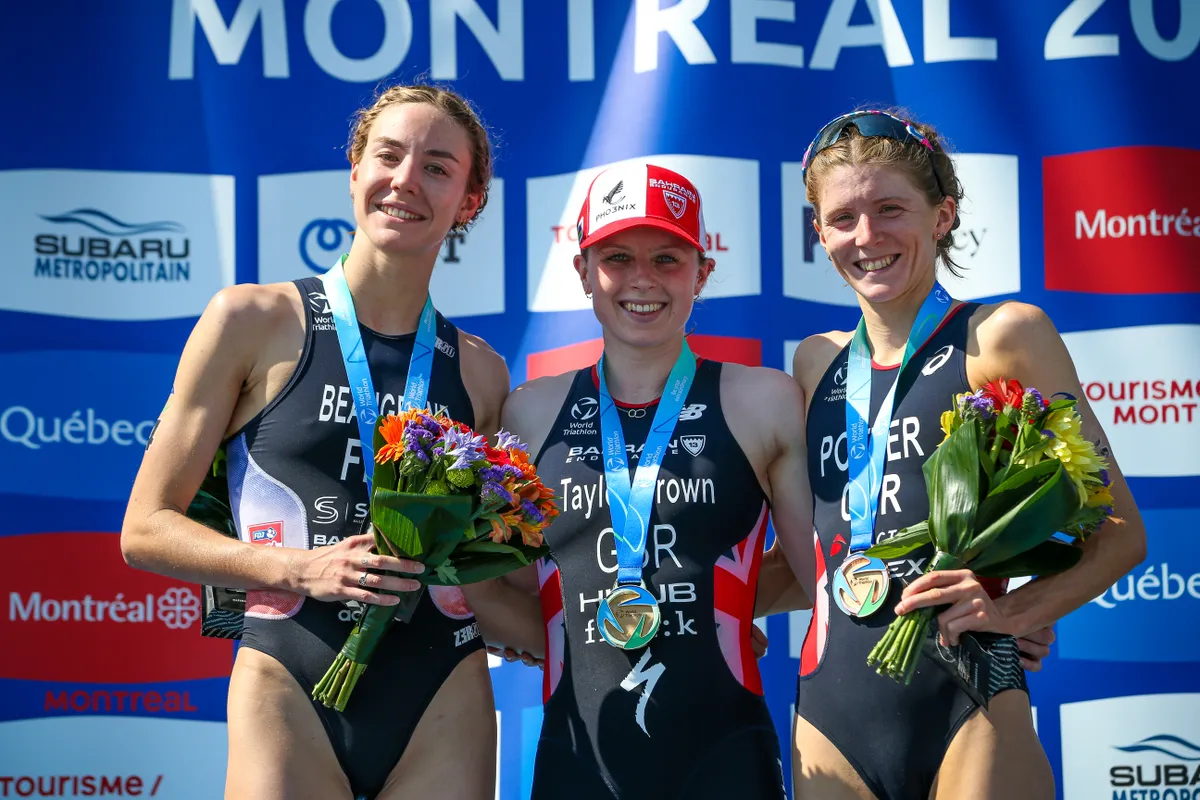
220: Congratulations for Montreal and Hamburg, a (respective) bronze and silver in consecutive races. How did it feel to mount your first World Series podium?
Beth Potter: It was pretty special [in Montreal]. I feel like it’s been building, it’s been coming, so just being able to execute the perfect race was something I just hadn’t quite done yet.
I felt like I was really competitive and that was a big step in the right direction for me.
220: What areas do you still need to work on do you think?
BP: I’m much better at positioning now, but I think just being a bit more confident coming in and out of T1 and T2. Being a bit more bolshy and being towards the front. Being confident basically!
But I grow in confidence the more races I do, and the better I do. I feel like it kind of snowballs with me. That’s why I’ve gone in with this full-on schedule.
220: What are your expectations for the Commonwealths?
BP: Everyone keeps going, oh, what are your goals for the Commonwealths, but I don’t think past the next race. It’s just one race at a time for me at the moment and not getting too far ahead of myself.
It’s similar as to when I was on the track. I don’t want to constantly think of a time to hit because whenever I did I never got it. It was in the races where I just raced that I did my best.
220: This is the first time you’ll be competing for Scotland in just triathlon
[Beth also did the 10,000m at the 2018 Commies]
. Are you feeling more pressure?
BP: I always really love competing for Scotland and obviously I don’t get the opportunity to do it often. But this one is quite special. And I feel like this time I’m ready.
I feel like last time when I competed in Gold Coast, I’d only ever done like five triathlons, so it was always going to be hard. But I’ve got lots more under my belt this time.
I’m going to go there and be competitive so that’s exciting. I’m not sure if it’ll top Glasgow [Commonwealths 2014, where she placed 5th in the 10,000m], though!
220: What does it mean to you to be part of such an incredible British women’s team? And how have they influenced your training and racing performance?
BP: Oh yeah, it’s really, really good. I was maybe fifth or six in that rank last year. And now I feel like I’m two or three.
I feel like once you’re at the top of the British girls, you are the best in the world because we are the best in the sport. It’s an exciting time and I’ve got still room for improvement.
I just like getting better all the time so it’s quite nice to always feel like you’re improving.
220: Do you ask for advice from your fellow British girls?
BP: We had a little bit of chat in between the races in Montreal. I wouldn’t say team tactics, but we all wanted each other to do well.
I think I get a lot of that side of things from the guys I train with. I was doing a bike session with Alistair [Brownlee] recently and he took me by surprise by starting to attack mid rep.
That’s what’s going to happen to me in races so I’m a lot more aware of it. So yeah, I take a lot from the guys that I train with. They’re constantly helping me improve, and they’re all such strong cyclists.
220: You’ve been in Leeds for over five years now, clearly that training environment is working for you.
BP: I think it’s only really been in the last two or three years that I’ve actually been able to consistently train, especially like this last winter, just being able to stack sessions on sessions, like good ones. And even on the bad days, still hitting good times.
But yeah, training with them [the Brownlees] is amazing. And I feel like they’ve had my back since day one. I was inspired by them after London 2012, so they’re the reason I moved to Leeds.
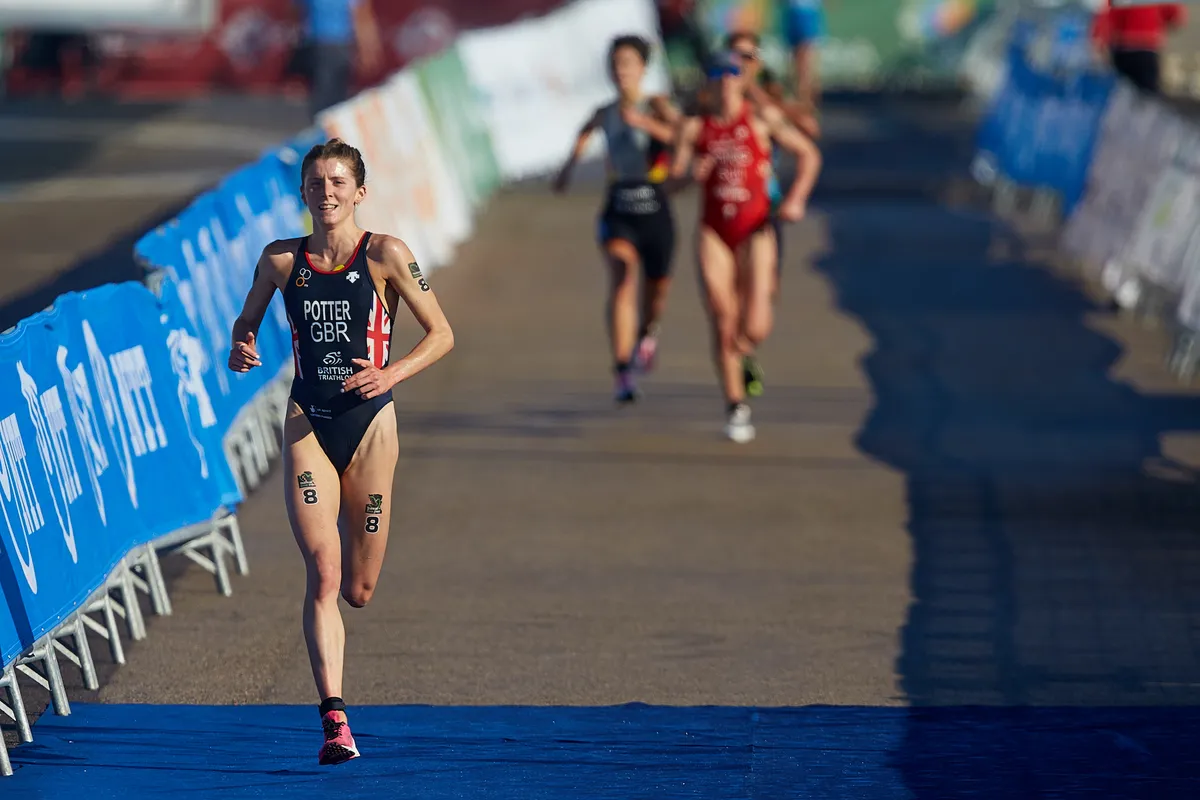
220: Your run is clearly your weapon, but how much training do you dedicate to the three sports each week?
BP: I’ve actually taken a real step back from running this year. Most of my training has been on the bike. I’ve put a lot of emphasis on that and a lot of work.
And to be honest, I feel quite relaxed on the start line now cause I know that I couldn’t have done anymore. Like I’ve thrown everything at it, absolutely everything.
So that’s quite a nice position to be in. So I do 14 hours on the bike, eight hours in the pool and then two hours of running and two gym sessions a week.
220: Do you miss the world of athletics?
BP: I don’t know. The sessions we cut out this winter were the longer sessions, like two mile and mile reps, stuff like that. I miss that side of it.
I obviously miss a lot of my friends, and the camaraderie that you would get on track. I really liked that social side of it.
I don’t know if I miss the major comps cause I just felt like I could never be competitive. But I love running, it’s still one of my favourite things to do.
But I really like riding my bike now as well! That makes the long hours of winter a lot better.
BETH'S TOP TRI HIGHLIGHTS
23 September 2017
Wins her first triathlon race as an elite at the Funchal ETU Sprint Triathlon European Cup
17 June 2018
First podium (silver) in an ITU World Cup race, in Antwerp
31 May 2019
Becomes European triathlon champion
6 May 2022
Wins the Arena Games Triathlon Series to become the first-ever esports triathlon world champion
25 June 2022
Takes her first WTCS podium in Montreal with a bronze. Two weeks later she wins silver in Hamburg behind reigning Olympic and world champ Flora Duffy
220: How do you think you’d fare against
[arguably one of the best runners in short-course triathlon history]
Gwen Jorgensen if you were both racing today?
BP: I feel like racing’s changed a bit since she was racing. Maybe we’d swim similarly, but I think the bike’s completely different now.
I didn’t really watch that much triathlon in that era, to be honest, but I think in a head-to-head track race, I could still have her. Not sure about a run off the bike, maybe she’d have me.
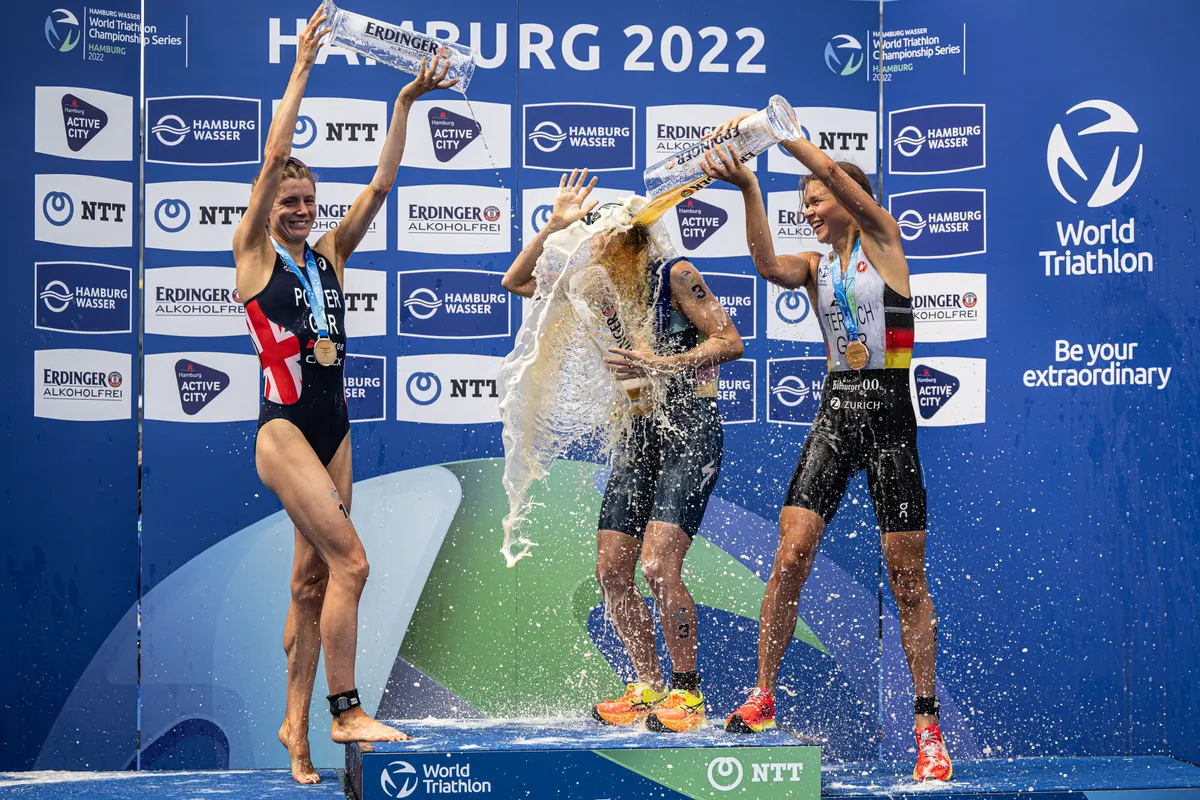
220: We’ve mentioned how full-on elite racing is now. How do you ensure you stay at the top of your game and injury-free?
BP: It’s just about being sensible. That’s easier said than done, but I’m really honest with myself. If something’s sore, then I don’t train through it.
I’ve had enough injuries to know the difference between something that’s just a training niggle or something that’s a bit more serious.
And never take your last race for granted; you’re only as good as your last race. I went to Hamburg with a target on my back, so I think just staying humble is key.
Also, if you’ve had a good race or a bad one just have a day to either be sad or happy about it and then get straight back into it. I feel like sometimes I don’t celebrate the good ones enough.
You can spend so long on the crap ones, like after Yokohama [she finished 11th], I was really down about that. But there was nothing I could do about it. I’d had a bad stomach, so it was just part and parcel of it all.
So yeah, it’s just about not getting too high or too low.
- How to recover from racing triathlon
- How to prevent injury before your first triathlon
- The 10 most common run injuries and how to prevent them
- Best knee supports for running
- The best Pilates exercises for triathletes to help strengthen feet and ankles
BETH'S TOP KIT - THE INCUS NOVA*
"I tend to use this more in the pool than on the run, just because that’s an area… well, I’ve done it for years! So swimming is the one where I find it most beneficial, being able to track my stroke rate.
“I’ve recently started using it in open water as well, and that’s been quite interesting to see the differences between open-water technique and indoor swimming technique.
“And also checking balance on each side. I’ve had a recurring shoulder injury on my right side so it’s been good to be able to monitor that and see the imbalances in my stroke.”
*With special thanks to Incus Performance for helping organise this interview
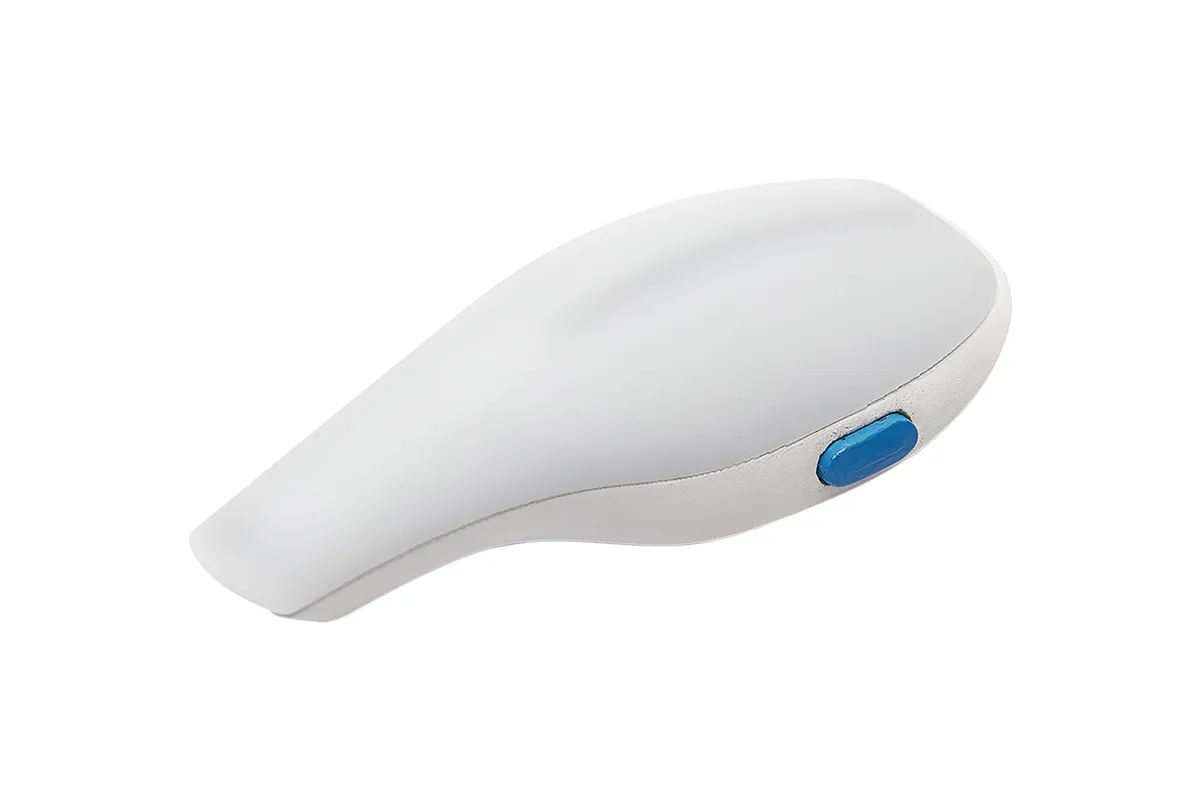
Top image: Petko Beier/Triathlon.org
